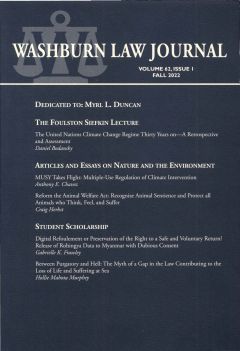
Washburn Law Journal
Recent Blog Post
ChatGPT-4 Understands Academic Attrition’s Impact on Bar Passage, but Does Anyone Else?
Rory Bahadur and Kevin Ruth | September 13, 2023 | Read this blog post
Summary: Access Lex recently published an article titled, and purportedly answering the question, “Are Law Schools Cream-Skimming to Bolster Their Bar Exam Pass Rates?” The article, however, does not answer the question asked, but rather answers another question, “Whether the impact of attrition and transfer on bar passage can be accurately detected using broad national level regression analysis?” The answer to the first question is yes, some schools’ bar passage rates are impacted by transfer and/or academic attrition. And the answer to the latter question is no, regression cannot accurately detect the impact of academic attrition and transfer on bar passage. In asking one question but instead answering the other, the article conflates and obfuscates the important difference between causation and correlation. In this short essay, we use artificial intelligence to demonstrate why, even though academic attrition and transfer can impact an individual institution’s bar passage rates, these impacts are not fully discernable using broad, national level, regression analysis. Additionally, conclusions based on regression analysis distract us from addressing the systemic inequities perpetuated by the bar examination.
Recent Comments
The Post-Roe Era: Standards of Care or Standards of Statute?
Caitlin A. Kremer | March 26, 2024 | Read this comment
Summary: Zurawski v. Texas is believed to be the first case women have sued for being denied an abortion since 1973. Since the Supreme Court overruled Roe v. Wade in June 2022, abortion access has been left to each individual state. After the Dobbs decision overturned Roe, Texas imposed a nearly complete abortion ban after six weeks of pregnancy. While the Texas law gives exceptions to its abortion ban, “Emergent Medical Condition Exception,” plaintiffs in Zurawski v. Texas claim the exceptions are too vague, making physicians wary about their liability in providing abortions, and putting patient lives at risk.
The case includes several plaintiffs who were denied abortions in Texas—all experiencing complications with desired pregnancies. While their situations vary, they all have the same thing in common: they were denied abortions in Texas that should have fallen under an emergency medical exception but ambiguity surrounding the Texas exceptions put the plaintiffs—and other fetuses—at risk.
The plaintiffs also include physicians. These physician plaintiffs fear losing their medical licenses, receiving hefty fines, and earning up to 99 years in prison for providing abortion services. Consequently, doctors are turning patients away and preventing patients from receiving the standard of care, or the degree of care a prudent and reasonable physician would provide in the same situation. The fear and uncertainty regarding the scope of the life and health exceptions in the Texas law have put patient lives and physician livelihood in danger. Such criminalization of a physician’s medical judgment is prohibiting adequate abortion care for fear of criminal and professional consequences, essentially coercing physicians away from the standard of care physicians should be providing.
Preferred Citation: Caitlin A. Kremer, The Post-Roe Era, 63 Washburn L.J. Online 55 (2024), https://www.washburnlaw.edu/publications/wlj/online/volume/63/kremer-roe.html.
Two-Stepping Around Reasonable Suspicion: How Shaw v. Jones Remedies the Present Battle but Fails to Win the War on Fourth Amendment Abuses in Kansas
Dillon M. Schreckler | March 26, 2024 | Read this comment
Summary: Since 2014, the Kansas Highway Patrol has used the “Kansas Two-Step” to combat the so-called “war on drugs.” To effectuate this strategy, troopers primarily stopped travelers from states which have legalized marijuana. Once a trooper initiates a legal pre-textual stop on an individual traveling through Kansas, they must have reasonable suspicion before searching the vehicle. This “two-step” strategy plays on a show of authority by officers unreasonably extending traffic stops to coerce consent to search a vehicle. The officer begins by telling a detained individual an ambiguous statement that may signal they are free to go, but after a momentary pause re-engages the motorist to attempt to coerce consent to search. The question before the Kansas district court was: does a reasonable person feel free to leave after the conclusion of a traffic stop, and does that person’s continued interaction with police suffice as a consensual encounter? The district court said no and found the Two-Step tactic unconstitutional, violating both the Fourth Amendment and 42 U.S.C § 1983. Yet, the court failed to provide a mechanism to prevent the possibility of future Fourth Amendment abuses on a nationwide scale. To counter this problem, a bright line rule requiring officers to inform motorists of their right to end the encounter is needed. This prerequisite helps ensure officers inform unaware citizens of their rights and then they can make the informed choice of whether to continue the encounter. This bright line rule would help officers to understand their Fourth Amendment obligations.
Preferred Citation: Dillon M. Schreckler, Two-Stepping Around Reasonable Suspicion, 63 Washburn L.J. Online 43 (2024), https://www.washburnlaw.edu/publications/wlj/online/volume/63/schreckler-stepping.html.
The Rapanos Nightmare is Over but WOTUS Worries Remain
Nicholas VanHee | March 21, 2024 | Read this comment
Summary: In Sackett v. Env’t Prot. Agency, the United State Supreme Court narrowed the Environmental Protection Agency’s and the United States Army Corps of Engineer’s jurisdiction over wetlands because of the confusion and lengthy and expensive litigation caused by the Rapanos decision in 2006. Although this resolved the long-standing problem of understanding the term “waters of the United States,” this ruling risks half of the remaining 100 million acres of wetlands in the lower forty-eight states. Justice Alito, author of the majority, relied upon scant legal authority to reach his conclusion that only adjoining wetlands should enjoy the protections of the Clean Water Act. In Riverside Bayview, the Supreme Court held that all adjacent wetlands including wetlands separated by a dam, dike, natural berm, or other barrier are protected. Now, these wetlands will no longer be protected thus jeopardizing the health of America’s waterways and its people. To limit the detrimental effects of this decision, Congress should use its power of the purse to incentivize states to take up their own wetland protection programs and include language in 2023 Farm Bill to conserve wetlands.
Preferred Citation: Nicholas VanHee, The Rapanos Nightmare Is Over but WOTUS Worries Remain, 63 Washburn L.J. Online 31 (2024), https://www.washburnlaw.edu/publications/wlj/online/volume/63/vanhee-wotus.html.
Acquitted-Conduct Sentencing: Judicially Bypassing the Fifth and Sixth Amendments [United States v. McClinton, 23 F.4th 732 (7th Cir. 2022), cert. denied, 143 S. Ct. 2400 (2023)]
Preston K. Killingsworth | March 21, 2024 | Read this comment
Summary: In United States v. McClinton, the Seventh Circuit Court of Appeals, affirmed by the Supreme Court, upheld the constitutionality of acquitted-conduct sentencing because a sentencing judge is allowed to take into consideration underlying conduct committed in furtherance of the crime charged, to enhance a defendant’s sentence. Relying on precedent that framed the issue under a Due Process analysis, the Supreme Court never really addressed the concerns regarding the Sixth Amendment right to a jury trial. Because acquitted-conduct sentencing undermines the jury’s role in a criminal trial, the use of acquitted-conduct to enhance a defendant’s sentence should be a violation of the Sixth Amendment. Additionally, with differentiating burdens of proof, the allowance of inadmissible evidence, and the vast amount of discretionary power at the sentencing phase, acquitted-conduct sentencing promotes unconstitutional practices under the Due Process Clause of the Fifth Amendment. Affirming the constitutionality of acquitted-conduct sentencing allows for manipulation of our criminal justice system.
Preferred Citation: Preston K. Willingsworth, Acquitted-Conduct Sentencing, 63 Washburn L.J. Online 19 (2024), https://www.washburnlaw.edu/publications/wlj/online/volume/63/killingsworth-sentencing.html.
The IDEA Behind Educationism and Meaningful Participation [Beer v. USD 512 Shawnee Mission]
Annie C. McHenry | February 22, 2024 | Read this comment
Summary: In Beer v. USD 512 Shawnee Mission, the United States District Court for the District of Kansas held that a child’s free, appropriate public education was denied partly due to the school’s failure to allow the parents to “participate meaningfully” in the creation of their child’s Individualized Education Program. The court conducted a thorough analysis of this issue and concluded that the parents needed not only access to all relevant information regarding their child’s education but also needed to understand the information they were given. This Comment discusses the educationism illustrated by the court and why structural change is necessary in order to ensure special needs children receive the level of education they are entitled to.
Preferred Citation: Annie C. McHenry, The IDEA Behind Educationism and Meaningful Participation, 63 Washburn L.J. Online 9 (2024), https://www.washburnlaw.edu/publications/wlj/online/volume/63/mchenry-educationism.html.
The Washburn Law Journal welcomes unsolicited manuscripts for publication consideration. Note: The Washburn Law Journal does not typically accept submissions from students.
All manuscripts should be double-spaced, notes should be in footnote form, and citations should conform to The Bluebook: A Uniform System of Citation (21st ed.). A copy of the manuscript should also be available as a Microsoft Word file (preferred).
Please direct manuscripts to the attention of the Articles Editor at journalarticles@washburnlaw.edu.
Washburn Law Journal also accepts submissions via ![]() (through March 31, 2021).
(through March 31, 2021).
Subscription Inquiries
If you have questions concerning subscriptions or non-received issues, please contact the Washburn Law Journal Secretary at (785) 670-1692 or via e-mail at journalclaims@washburnlaw.edu.
Washburn Law Journal
Washburn University School of Law
1700 SW College Ave.
Topeka, KS 66621
(785) 670-1683
journal@washburnlaw.edu
(general correspondence)
journaleditor@washburnlaw.edu
(Editor-in-Chief)
Short URL for this page:
https://washburnlaw.edu/wlj

Washburn University School of Law
and the Washburn Law Journal
proudly present
Associate Dean Holly Doremus
Associate Dean, Faculty Development and Research and the James H. House and Hiram H. Hurd Professor of Environmental Regulation at the University of California, Berkeley, School of Law
"Reimagining a River"
Monday, March 25, 2024
12:30 p.m. CT • Room 152
See the Washburn Law Journal Volume 63 Board of Editors and Staff Members.
Beginning with volume 57, student comments are published online at wljonline.org.
